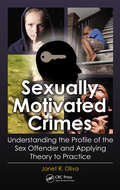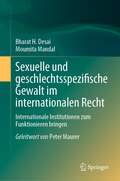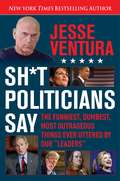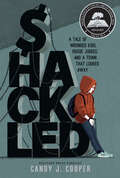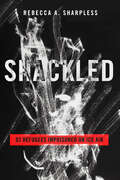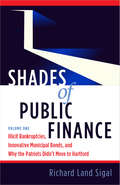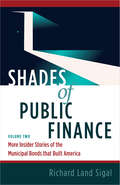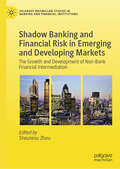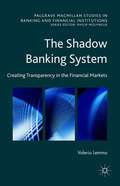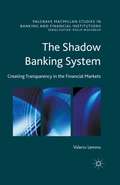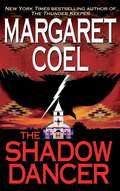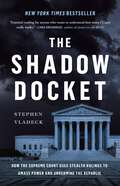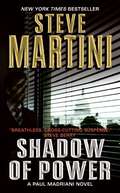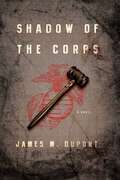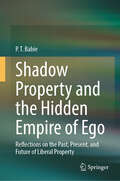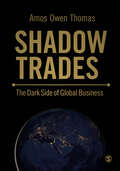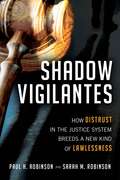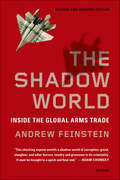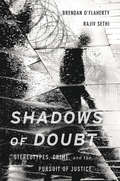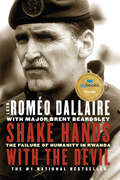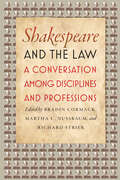- Table View
- List View
Sexually Motivated Crimes: Understanding the Profile of the Sex Offender and Applying Theory to Practice
by Janet R. OlivaIn cases where minimal or no physical evidence exists, behavioral evidence may be all that investigators have available to help them focus the investigation. It may be the only aspect of the case that can link one unsolved case to another, or to numerous other unsolved cases. Sexually Motivated Crimes: Understanding the Profile of the Sex Offender
Sexuelle und geschlechtsspezifische Gewalt im internationalen Recht: Internationale Institutionen zum Funktionieren bringen
by Bharat H. Desai Moumita MandalDieses Buch behandelt sexuelle und geschlechtsspezifische Gewalt (SGBV) gegen Frauen aus völkerrechtlicher Sicht. Es zeigt die Gründe für SGBV gegen Frauen auf, wobei der Schwerpunkt auf kulturellen Praktiken liegt, mit denen versucht wird, sie zu rechtfertigen, und verdeutlicht die rechtlichen Herausforderungen im Zusammenhang mit dem Thema sowohl für nationale als auch internationale Justizsysteme. Die sieben Kapitel des Buches sind: i) Einleitung ii) SGBV ein globales Problem; iii) Internationaler Rechtsschutz; iv) Rolle der internationalen Institutionen; v) Rolle kultureller Faktoren und vi) Herausforderungen vii) Schlussfolgerungen. Vor dem Hintergrund konzertierter globaler Bemühungen, SGBV gegen Frauen zu beenden oder zumindest stark einzudämmen, bietet das Buch einen Fahrplan für das System der Vereinten Nationen, Staaten, internationale Institutionen, multidisziplinäre Wissenschaftler, Organisationen der Zivilgesellschaft und andere globale Akteure.Das Buch enthält ein Vorwort von Peter Maurer, Präsident des Internationalen Komitees vom Roten Kreuz (IKRK).
Sh*t Politicians Say: The Funniest, Dumbest, Most Outrageous Things Ever Uttered By Our "Leaders"
by Jesse VenturaFrom the moment a Founding Father first asked for a vote, politicians have been saying dumb stuff. From George Washington to George Bush (both of them!) right on to present-day pundits like Donald Trump, Sarah Palin, and Hillary Clinton, political leaders can always be counted on to say funny, exasperating, and nonsensical things, often unintentionally. In Sh*t Politicians Say, Jesse Ventura shares the most entertaining and disturbing ?thoughts” from his political brethren, including these winners: "The concept of global warming was created by and for the Chinese in order to make U.S. manufacturing non-competitive.” —Donald Trump "I am not worried about the deficit. It is big enough to take care of itself.” —Ronald Reagan "I think gay marriage is something that should be between a man and a woman.” —Arnold Schwarzenegger "I love California, I practically grew up in Phoenix.” —Dan Quayle "A zebra does not change its spots.” —Al Gore "People have got to know whether or not their president is a crook. Well, I’m not a crook. I’ve earned everything I’ve got.” —Richard Nixon "Death has a tendency to encourage a depressing view of war.” —former Defense Secretary Donald Rumsfeld "I’ll be long gone before some smart person ever figures out what happened inside this Oval Office.” —George W. Bush From bigoted statements to outright lies . . . flip-flopping to just TMI, Sh*t Politicians Say will provide readers with a welcome respite from the presidential campaigns.
Shackled: A Tale of Wronged Kids, Rogue Judges, and a Town that Looked Away
by Candy J. CooperHere is the explosive story of the Kids for Cash scandal in Pennsylvania, a judicial justice miscarriage that sent more than 2,500 children and teens to a for-profit detention center while two judges lined their pockets with cash, as told by Candy J. Cooper, an award-winning journalist and Pulitzer Prize finalist.In the early 2000s, Judge Mark Ciavarella and Judge Michael Conahan of Luzerne County, Pennsylvania were known as no-nonsense judges. Juveniles who showed up in their courtrooms faced harsh words and even harsher sentencing. In the post-Columbine era, many people believed that was just what the county needed to ensure its children and teens stayed on the straight and narrow path. But as more and more children faced shocking sentences for seemingly benign crimes, and a newly built for-profit detention center filled up further and further, a sinister pattern of abuses and bribery emerged. Through extensive research and original reporting leading into contemporary times, award-winning journalist Candy J. Cooper tells the story of a scandal that the Juvenile Law Center calls &“one of the largest and most serious violations of children&’s rights in the history of the American legal system.&”
Shackled: 92 Refugees Imprisoned on ICE Air
by Rebecca A. SharplessA rare look at the brute-force mechanics of deportation in the United States. In December 2017, U.S. immigration authorities shackled and abused 92 African refugees for two days while attempting to deport them by plane to Somalia. When national media broke the story, government officials lied about what happened. Shackled tells the story of this harrowing failed deportation, the resulting class action litigation, and two men's search for safety in the United States over the course of three long years. Through Abdulahi's and Sa'id's firsthand accounts, immigration lawyer Rebecca A. Sharpless brings to life the harsh consequences of the U.S. deportation system and how racism and anti-Blackness operate within it. Sharpless follows the money that ICE funnels into local jails, private contractors, and charter jets, exposing a sprawling system of immigration enforcement that detains and abuses noncitizens at scale. Woven with the wider context of Abdulahi's and Sa'id's stories, this immigration odyssey reveals disturbing truths about Somalia, asylum, and the U.S. court system. Shackled will galvanize readers—attorneys, activists, policymakers, and scholars alike—to call out and dismantle this brutal infrastructure.
Shades of Grey - Domestic and Sexual Violence Against Women: Law Reform and Society
by Anna Carline Patricia EastealArguing that law must be looked at holistically, this book investigates the ‘hidden gender’ of the so-called neutral or objective legal principles that structure the law addressing violence against women. Adopting an explicitly feminist perspective, it investigates how legal responses to violence against women presuppose, maintain and perpetuate a certain context that may not in fact reflect women’s experiences. Carline and Easteal draw upon relevant legislation, case law and secondary studies from a range of territories, including Australia, England and Wales, the United States, Canada and Europe, to contextualize and critique different policy responses. They go on to examine the potential and limits of law, making recommendations for best practice models of policymaking and law reform. Aiming to help improve government, community and legal responses to women who experience violence, Shades of Grey – Domestic and Sexual Violence Against Women: Law Reform and Society will assist law-makers, academics, policymakers and a wider audience in understanding the complexities of violence against women.
Shades of Public Finance Vol. 1: Illicit Bankruptcies, Innovative Municipal Bonds, and Why the Patriots Didn't Move to Hartford (Shades of Public Finance #1)
by Richard Land Sigal"Using knowledge gained in fifty-plus years at the cutting edge of public finance, Sigal clears the smoke and moves the mirrors to let the rest of us see how it is done.... When they say it is not about the money, they are wrong. It always is. And the ultimate question is ‘whose money?’ " - Majorie Smith, Chair, New Hampshire House Judiciary Committee; former Chair, NH House Finance Committee and Joint Fiscal CommitteeShades of Public Finance Vol. 1 lifts the curtain on aspects of American civil and financial underpinnings that most people know little about. Local water treatment systems, state university campuses, roads, parks and many other features of our cities and states have been built with local control and local decision-making because imaginative figures like Richard Sigal found ways to turn community assets into cash through bonds. Sigal explains in clear language how bonds are structured, who gets rich, who gets stuck and how politics impacts bond financing. This book will answer these questions and more:•Why the Patriots didn't move to Hartford;•Why bankruptcy and a city manager in Detroit may not have helped the city; •How we quietly abandoned the principles of Alexander Hamilton in 2016; •How municipal bonds really work; •And who really gets rich from your taxes and bonds. Sigal highlights the frightening prospect of centralized, federal control of local communities infrastructure and growth because municipal bankruptcy has become an acceptable strategy in difficult financial times, despite workable options that preserve local creditworthiness. "A great read for history and to grasp the importance of public finance experts in meeting everyday needs." ---Thomas Ritter, Chair, UCONN Board of Trustees; past Speaker of the Connecticut House of Representatives
Shades of Public Finance Vol. 2: More Insider Stories of the Municipal Bonds that Built America (Shades of Public Finance #2)
by Richard Land Sigal"In Texas, there are 4,900 parcels of property within 500 feet of the border....The entire process of “eminent domain” — the legal term for government taking private property — along the border makes a sham of the Constitution’s requirement that 'private property (not) be taken for public use, without just compensation.'" -InsideSources, "Building the Wall Using Eminent Domain Hurts Americans"Shades of Public Finance Vol. 2 takes readers through some of the most pressing concerns of the day. Welcome to learning about these important issues in public finance: •clean water, •solid waste disposal, •highways, utilities, open space, •gambling and native Americans, •public authorities, •reciprocal tax immunity, and •eminent domain. You may not realize it, but these topics reside in the shadows of your everyday life and budget."Whether you write the tax laws or pay the taxes that result, function in the private sector or the public, or care about potholes or wastewater, you will find Sigal’s stories behind the stories fascinating. When they say it is not about the money, they are wrong. It always is. And the ultimate question is ‘whose money?’ Sigal explains it clearly." - Majorie Smith, Chair, New Hampshire House Judiciary Committee; former Chair, NH House Finance Committee and Joint Fiscal Committee
Shadow Banking and Financial Risk in Emerging and Developing Markets: The Growth and Development of Non-Bank Financial Intermediation (Palgrave Macmillan Studies in Banking and Financial Institutions)
by Sheunesu ZhouThis book discusses non-bank financial intermediation as an alternative or complement to formal banking. With a focus on emerging and developing economies, which face far greater consequences of high risk taking and withdrawal of credit from their financial systems, the book starts with an overview of non-bank financial intermediation, including shadow banking activities, instruments and functions. It covers the main types of activities classified under non-bank financial intermediation and the different players in the non-bank financial system. The interconnectedness between shadow banking and formal banks and their consequential risks will be analysed. Furthermore, the book analyses recent data on shadow banking with a view to estimate the extent of riskiness in shadow banking activities. Analysis of risk spill overs between the formal banking system and shadow banks will be conducted and contribution of shadow banking to systemic risk metrics will also be analysed. This book discusses non-bank financial intermediation as an alternative or complement to formal banking. With a focus on emerging and developing economies, which face far greater consequences of high risk taking and withdrawal of credit from their financial systems, the book starts with an overview of non-bank financial intermediation, including shadow banking activities, instruments and functions. It covers the main types of activities classified under non-bank financial intermediation and the different players in the non-bank financial system. The interconnectedness between shadow banking and formal banks and their consequential risks will be analysed. Furthermore, the book analyses recent data on shadow banking with a view to estimate the extent of riskiness in shadow banking activities. Analysis of risk spillovers between the formal banking system and shadow banks will be conducted and contribution of shadow banking to systemic risk metrics is also presented.
The Shadow Banking System: Creating Transparency in the Financial Markets (Palgrave Macmillan Studies in Banking and Financial Institutions)
by Valerio LemmaThe book shows the fundaments of the shadow banking system and its entities, operations and risks. Focusing on the regulatory aspects, it provides an original view that is able to demonstrate that the lack of supervision is a market failure.
The Shadow Banking System: Creating Transparency in the Financial Markets (Palgrave Macmillan Studies in Banking and Financial Institutions)
by Valerio LemmaThe book shows the fundaments of the shadow banking system and its entities, operations and risks. Focusing on the regulatory aspects, it provides an original view that is able to demonstrate that the lack of supervision is a market failure.
The Shadow Dancer
by Margaret CoelJames Sherwood claims to have been to the shadow world. He claims to know the future. He also claims to have no connection to the disappearance of Dean Little Horse or the murder of Ben Holden...
The Shadow Docket: How the Supreme Court Uses Stealth Rulings to Amass Power and Undermine the Republic
by Stephen VladeckAn instant New York Times bestseller: An acclaimed legal scholar&’s &“important&” (New York Times) and &“fascinating&” (Economist) exposé of how the Supreme Court uses unsigned and unexplained orders to change the law behind closed doors. The Supreme Court has always had the authority to issue emergency rulings in exceptional circumstances. But since 2017, the Court has dramatically expanded its use of the behind-the-scenes &“shadow docket,&” regularly making decisions that affect millions of Americans without public hearings and without explanation, through cryptic late-night rulings that leave lawyers—and citizens—scrambling. The Court&’s conservative majority has used the shadow docket to green-light restrictive voting laws and bans on abortion, and to curtail immigration and COVID vaccine mandates. But Americans of all political stripes should be worried about what the shadow docket portends for the rule of law, argues Supreme Court expert Stephen Vladeck. In this rigorous yet accessible book, he issues an urgent call to bring the Court back into the light.
The Shadow Economy
by Friedrich Schneider Dominik H. EnsteEuropean and Australian economists share recent findings on the size and development of the shadow economies; the driving factors of the shadow economy; and its interaction with tax morale, government institutions, and corruption. Their topics include a first attempt at a public choice explanation for the size and development of the shadow economy in India, regional variations in the nature of the shadow economy as revealed in a survey of 27 European Union member states, representative survey data in Germany on who is working illicitly and why, a critical appraisal of existing evidence on the link between the intrinsic motivation to comply with tax law and actual compliance behavior, and a latent variables approach to the impact of institutions on the shadow economy and corruption. Annotation ©2012 Book News, Inc. , Portland, OR (booknews. com)
The Shadow of a Crime - Novel
by Hall CaineThe central incident of this novel is that most extraordinary of all punishments known to English criminal law, the peine forte et dure. The story is not, however, in any sense historical. A sketchy background of stirring history is introduced solely in order to heighten the personal danger of a brave man. The interest is domestic, and, perhaps, in some degree psychological. Around a pathetic piece of old jurisprudence I have gathered a mass of Cumbrian folk-lore and folk-talk with which I have been familiar from earliest youth. To smelt and mould the chaotic memories into an organism such as may serve, among other uses, to give a view of Cumberland life in little, has been the work of one year.
Shadow of Power
by Steve MartiniNew York Times bestselling master of suspense Steve Martini returns, ensnaring defense attorney Paul Madriani in a web of terror and death being spun in the shadows of America's most sacred and secretive institution--the Supreme Court. A writer is savagely slain while on a publicity tour--a literary provocateur who craved headlines, but whose last book may have gone too far. His revelations about secret language buried in the U.S. Constitution--and hints about an explosive missing letter of Thomas Jefferson's--may be enough to cause an irreparable tear in the fabric of the nation . . . and perhaps drove a volatile youth to homicide. But Paul Madriani thinks a troubled young man with dark connections has been chosen as a scapegoat to cover up something far deadlier that festers in America's political heart. And in the wake of the strange disappearance of a Supreme Court judge, Madriani must survive long enough to find the devastating answers hidden in the shadow of power.
Shadow of the Corps
by James M. DuPontDale Riley, fresh out of law school, joined the Marine Corps to be a hero. As a JAG attorney, he was out to save the world. But when he takes on the wrong client—a combat pilot accused of unlawfully bombing a village in northeastern Afghanistan—his world quickly comes undone. It&’s not enough for Dale to save his career. Now, he&’s fighting to save his life, and the lives of his wife and son.In the tradition of A Few Good Men, nothing in James M. DuPont&’s taut debut novel is at it seems, and the line between guilt and innocence is as delicate and unpredictable as the line between life and death itself.
Shadow Property and the Hidden Empire of Ego: Reflections on the Past, Present, and Future of Liberal Property
by P. T. BabieThis book explores the nature of liberal property in the twenty-first century. It contains three parts. The first examines how we have arrived at the liberal concept of property—what many scholars call the 'bundle of rights' metaphor of property. This part argues that the liberal conception embodied in the bundle of rights metaphor is really a way of masking or hiding what property really is: an exercise of ego about the way goods and resources are used. Or, put another way, it enshrines the ability to suit personal preferences about the way things are used, rather than what might better serve the common good. The second part provides an important modern critique of the bundle of rights metaphor—that, in addition to being a collection of rights, property is also about social relations that exist between people. Through these social relations, which are contained in law, any decision that a person makes about how to use a good or resource necessarily carries implications for others. While those effects can be both positive and negative, we are much more familiar with the latter, including most of the global challenges we face today—climate change, extreme weather, global hunger, and global poverty. Taking those global challenges as its focus, the final part of the book suggests possible futures of property in which it is reconceived in ways that reduce the potential for negative impacts on others.
Shadow Trades: The Dark Side of Global Business
by Amos Owen ThomasAlongside burgeoning global business, which asserts its legality, ethics and social responsibility, there exists a dark side of shadow trades manifesting various shades of legitimacy. Not only do the latter’s corrupt practices, dubious supply chains and other illicit operations run in tandem with global business, these borderless trades intersect with economic structures and contribute to systems adopted by corporations, endorsed by neoliberal capitalism, that are often condoned by governments and unwittingly sustained by consumers. In a very real sense, all of us may be implicated in shadow trades through our work, consumption and citizenship. Even before we can begin to confront and constrain shadow trades, their business models first need to be identified and analysed in all their networked complexity, interconnectivity with global business and embeddedness within the world economy. Numerous hard questions need to be raised around enabling circumstances and responsibilities of stakeholders, as well as the winners and losers resulting from business globalisation and socio-economic inequities within and between countries. Providing background, evidence and analysis on select exemplars of shadow trades, this book provides graduate students of business, plus scholars in the social sciences, together with practitioners and policymakers, consumer groups and civil society, with an indispensable resource for critical engagement. Only through knowledge gained by research and advocacy for transparency can we begin to shed light on this dark side of global business, enabling all of us to grapple with activism against and collaborative action towards undermining all shadow trades. Amos Owen Thomas was a Docent / Reader in Marketing and International Business at Stockholm University until his recent retirement
Shadow Trades: The Dark Side of Global Business
by Amos Owen ThomasAlongside burgeoning global business, which asserts its legality, ethics and social responsibility, there exists a dark side of shadow trades manifesting various shades of legitimacy. Not only do the latter’s corrupt practices, dubious supply chains and other illicit operations run in tandem with global business, these borderless trades intersect with economic structures and contribute to systems adopted by corporations, endorsed by neoliberal capitalism, that are often condoned by governments and unwittingly sustained by consumers. In a very real sense, all of us may be implicated in shadow trades through our work, consumption and citizenship. Even before we can begin to confront and constrain shadow trades, their business models first need to be identified and analysed in all their networked complexity, interconnectivity with global business and embeddedness within the world economy. Numerous hard questions need to be raised around enabling circumstances and responsibilities of stakeholders, as well as the winners and losers resulting from business globalisation and socio-economic inequities within and between countries. Providing background, evidence and analysis on select exemplars of shadow trades, this book provides graduate students of business, plus scholars in the social sciences, together with practitioners and policymakers, consumer groups and civil society, with an indispensable resource for critical engagement. Only through knowledge gained by research and advocacy for transparency can we begin to shed light on this dark side of global business, enabling all of us to grapple with activism against and collaborative action towards undermining all shadow trades. Amos Owen Thomas was a Docent / Reader in Marketing and International Business at Stockholm University until his recent retirement
Shadow Vigilantes: How Distrust In The Justice System Breeds A New Kind Of Lawlessness
by Paul H. Robinson Sarah M. RobinsonA form of subtle vigilantism threatens to undermine the justice system and is eroding community trust in law enforcement.A pervasive and destructive problem is afflicting our current justice system, eroding community confidence in law enforcement. "Shadow vigilantism" is a vicious cycle in which ordinary people, as well as criminal justice officials, are so fed up with the system's failures that they distort and subvert the system to force it to do the justice that it seems reluctant to do on its own. The effects of this lack of trust are pervasive and pernicious: citizens refuse to report a crime or help investigators; jurors refuse to indict or convict; and officials manipulate a system that is perceived to be unreliable. This downward spiral eventually undermines the moral authority of law enforcement and creates widening rifts in the community.This book examines many examples of how the community has responded when the justice system is perceived to fail, including the infamous murder of Emmett Till, which became a cause that spurred on the NAACP and the civil rights movement; the Lavender Panthers, which formed in response to gay bashing during the 1980s; the Crown Heights Maccabees, a neighborhood watch group that successfully reduced neighborhood crime when the police failed to do so; the Animal Liberation Front, which struck back at institutions for perceived abuses to animals; Operation Perverted Justice, an organization that used online chat rooms to out pedophiles by publicizing their personal information; and many others.Such examples highlight the importance of upholding a justice system that works to provide justice for all and is not perceived to condone legal technicalities that overturn just punishment, judicial rules that suppress evidence and let serious offenders go, and other actions that undermine public trust in the system.
The Shadow World: Inside the Global Arms Trade
by Andrew FeinsteinThe Shadow World presents the behind-the-scenes tale of the global arms trade, exposing in forensic detail the deadly collusion that too often exists among senior politicians, weapons manufacturers, felonious arms dealers, and the military--a situation that compromises our security and undermines our democracy. Now a major PBS documentary "An authoritative guide to the business of war. Chilling, heartbreaking, and enraging."--Arundhati Roy Andrew Feinstein reveals the cover-ups behind a range of weapons deals, from the largest in history--between the British and Saudi governments---to the guns-for-diamonds deals in Africa and the current $60 billion U.S. weapons contract with Saudi Arabia. Based on pathbreaking reporting and unprecedented access to top-secret information, The Shadow World takes us into a clandestine realm that is as vitally important as it is shocking.
Shadows of Doubt: Stereotypes, Crime, and the Pursuit of Justice
by Brendan O'Flaherty Rajiv SethiCrime and punishment occur under extreme uncertainty. Offenders, victims, police, judges, and jurors make high-stakes decisions with limited information under severe time pressure. With compelling stories and data on how people act and react, O’Flaherty and Sethi reveal the extent to which we rely on stereotypes as shortcuts in our decision making.
Shake Hands With the Devil: The Failure of Humanity in Rwanda
by Romeo DallaireOn the tenth anniversary of the date that UN peacekeepers landed in Rwanda, Random House Canada is proud to publish the unforgettable first-hand account of the genocide by the man who led the UN mission. Digging deep into shattering memories, General Dallaire has written a powerful story of betrayal, naïveté, racism and international politics. His message is simple and undeniable: “Never again.”When Lt-Gen. Roméo Dallaire received the call to serve as force commander of the UN intervention in Rwanda in 1993, he thought he was heading off on a modest and straightforward peacekeeping mission. Thirteen months later he flew home from Africa, broken, disillusioned and suicidal, having witnessed the slaughter of 800,000 Rwandans in only a hundred days. In Shake Hands with the Devil, he takes the reader with him on a return voyage into the hell of Rwanda, vividly recreating the events the international community turned its back on. This book is an unsparing eyewitness account of the failure by humanity to stop the genocide, despite timely warnings.Woven through the story of this disastrous mission is Dallaire’s own journey from confident Cold Warrior, to devastated UN commander, to retired general engaged in a painful struggle to find a measure of peace, reconciliation and hope. This book is General Dallaire’s personal account of his conversion from a man certain of his worth and secure in his assumptions to a man conscious of his own weaknesses and failures and critical of the institutions he’d relied on. It might not sit easily with standard ideas of military leadership, but understanding what happened to General Dallaire and his mission to Rwanda is crucial to understanding the moral minefields our peacekeepers are forced to negotiate when we ask them to step into the world’s dirty wars.Excerpt from Shake Hands with the DevilMy story is not a strictly military account nor a clinical, academic study of the breakdown of Rwanda. It is not a simplistic indictment of the many failures of the UN as a force for peace in the world. It is not a story of heroes and villains, although such a work could easily be written. This book is a cri de coeur for the slaughtered thousands, a tribute to the souls hacked apart by machetes because of their supposed difference from those who sought to hang on to power. . . . This book is the account of a few humans who were entrusted with the role of helping others taste the fruits of peace. Instead, we watched as the devil took control of paradise on earth and fed on the blood of the people we were supposed to protect.From the Hardcover edition.
Shakespeare and the Law: A Conversation Among Disciplines and Professions
by Bradin Cormack, Martha C. Nussbaum, and Richard StrierWilliam Shakespeare is inextricably linked with the law. Legal documents make up most of the records we have of his life, and trials, lawsuits, and legal terms permeate his plays. Gathering an extraordinary team of literary and legal scholars, philosophers, and even sitting judges, Shakespeare and the Law demonstrates that Shakespeare’s thinking about legal concepts and legal practice points to a deep and sometimes vexed engagement with the law’s technical workings, its underlying premises, and its social effects. The book’s opening essays offer perspectives on law and literature that emphasize both the continuities and contrasts between the two fields. The second section considers Shakespeare’s awareness of common law thinking and common law practice, while the third inquires into Shakespeare’s general attitudes toward legal systems. The fourth part of the book looks at how law enters into conversation with issues of politics and community, whether in the plays, in Shakespeare’s world, or in our own world. Finally, a colloquy among Supreme Court Justice Stephen Breyer, Judge Richard Posner, Martha C. Nussbaum, and Richard Strier covers everything from the ghost in Hamlet to the nature of judicial discretion.
